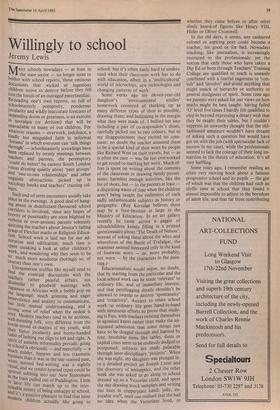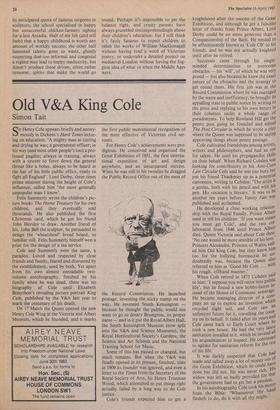Willingly to school
Jeremy Lewis
Many schools nowadays — at least in the state sector — no longer seem to bother with school reports, those ominous documents that wicked or ingenious Children strove to destroy before they fell into the hands of an outraged paterfamilias. Re-reading one's own reports, so full of schoolmasterly pomposity, ponderous Jocularity and wildly inaccurate forecasts of Impending doom or greatness, is an exercise In nostalgia (or derision) that will be unavailable to many of our children. For whatever reasons — overwork, indolence, a kindly but misguided faith in informal 'forums' in which everyone can 'talk things through — schoolmasterly scrawlings have been replaced by termly meetings between teachers and parents, the peremptory 'could do better' by earnest South London voices droning quietly about 'peer groups and 'one-to-one relationships' and other ungainly abstractions picked up in s,°eiology books and teachers' training col-
leges.
Such end-of-term encounters usually take Place in the evenings. A good deal of hang- ing about in disinfectant-flavoured school corridors is involved, since any hopes of brevity or punctuality are soon blighted by verbose or over-anxious parents solemnly cluIzzing the teachers about Jessica's failing grasp of Fletcher maths or Religious Educa- tion. School work is laid out for our ad- miration and edification: much time is spent sneaking a look at other children's work, and wondering why they seem to be so much more assiduous (boringly so, of course) than one's own. Unregenerate stuffies like myself tend to find the eventual discussions with the teachers rather painful affairs, not dissimilar to goodwill meetings with Japanese or Africans with a feeble grip on the language: much grinning and eager benevolence and anxiety to communicate, but little mutual understanding, and a i strong sense of relief when the ordeal s Over- Modern teachers tend to be anxious, \v, di-meaning folk, very different from the bottle-nosed ex-majors of my youth, with their fierce jocularity and horny-handed habit of lashing out clips to left and right. A
Spirit amiable informality prevails: going to school is obviously — and mercifully — a
,nlueh milder, happier and less traumatic business than it was in the tear-stained past, When massed bed-wetting was a nightly ritual, and we tender-hearted types could be sP°tted sobbing into our New Statesmans as the train pulled out of Paddington. Little i0. later life can match up to the inter- minable misery of being unhappy at school, a it's s a positive pleasure to find that most Modern children actually like going to
school: but it's often fairly hard to unders- tand what their classroom work has to do with education, albeit in a 'multicultural' world of microchips, new technologies and changing patterns of work.
Some weeks ago my eleven-year-old
daughter's 'environmental studies' homework consisted of thinking up as many different types of shoe as possible, drawing them, and indicating in the margin what they were made of. I bullied her into including a pair of co-respondent's shoes, carefully picked out in two colours, but to my disappointment they excited no com- ment: no doubt the teacher assumed them to be a special kind of shoe worn by people like Richard West on their travels, but — as is often the case — was far too overworked to get round to marking her work. Much ef- fort is spent on writing about the contents of the classroom or drawing family posses- sions: harmless enough activities, like the list of shoes, but — to the parents at least — a dispiriting waste of time when the children aren't being taught the rudiments of such sadly unfashionable subjects as history or geography. (Roy Kerridge believes there may be a foot-fetishist at large in the Ministry of Education. In an art gallery recently he came across a gaggle of schoolchildren keenly filling in a printed questionnaire about 'The Death of Nelson': instead of asking them about the whys and wherefores of the Battle of Trafalgar, the examiner seemed interested only in the kind of footwear worn — or, more probably, not worn — by the characters in the pain- ting.) Educationalists would argue, no doubt, that by starting from the particular and the local school work can be made 'relevant' to ordinary life, and of immediate interest; and that pettifogging details shouldn't be allowed to swamp or destroy 'spontaneity' and 'creativity'. Anxiety to relate school work to ordinary life goes hand-in-hand with strenuous efforts to prove that study- ing is Fun, with teachers twisting themselves in agonised knots rather than make the just admission that some things have to be slogged through and learned by rote. Insoluble items like tables, dates or capital cities seem to be endlessly dodged or postponed; subjects are made palatable through inter-disciplinary 'projects'. When she was eight, my daughter was plunged in- to a detailed project on Joseph Lister and the discovery of antiseptics, and the other week she was asked to go along to school dressed up as a Victorian child, and spent the day drawing mock samplers and writing out lines in copperplate hand: jolly, en- joyable stuff, until one realised that she had no idea when the Victorians lived, or
whether they came before or after other dimly heard-of figures like Henry VIII, Hitler or Oliver Cromwell.
In the old days, it seems, any cashiered colonel or aspiring poet could become a teacher, for good or for bad. Nowadays teaching, like journalism, is increasingly restricted to the professionals: yet the notion that only those who have taken a Dip Ed or been through Teachers' Training College are qualified to teach is uneasily combined with a fearful eagerness to 'con- sult' and 'involve' and avoid anything that might smack of hierarchy or authority or general stodginess of spirit. Some time ago we parents were asked for our views on how maths might be best taught: having failed '0' level five times I hardly felt qualified to chip in beyond expressing a dreary wish that they be taught their tables, but I couldn't suppress an unworthy thought that the old- fashioned amateurs wouldn't have dreamt of asking such a question but would have got on with the job (with spectacular lack of success in my case), while the professionals seemed to lack the courage of their long im- mersion in the theory of education. It's all very baffling.
Some years ago, I remember reading an often very moving book about a famous progressive school and its pupils — the gist of which was that the children had such an idyllic time at school that they found it almost impossible to adjust to the boredom of adult life, and that far from contributing its anticipated quota of famous surgeons or sculptors, the school specialised in happy but unsuccessful chicken-farmers sighing for a lost Arcadia. Half of me felt (and still feels) that a happy childhood is worth any amount of worldly success; the other half lamented talents gone to waste, glumly suspecting that too informal and congenial a regime may lead to happy mediocrity, but doesn't produce those driven, often rather tiresome, spirits that make the world go round. Perhaps it's impossible to get the balance right, and crusty parents have always grumbled uncomprehendingly about their children's education: but I still think it's fairly fatuous to expect children to relish the works of William MacGonagall without having read a word of Victorian poetry, or undertake a detailed project on mediaeval London without having the fog- giest idea of what or when the Middle Ages were.











































 Previous page
Previous page